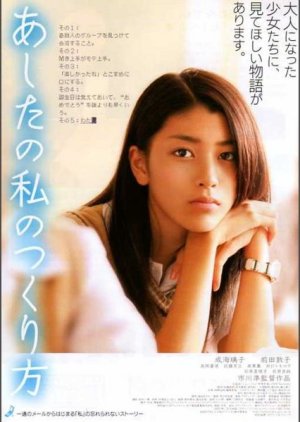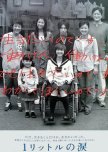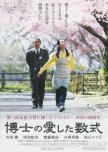Juri secretly admires Kanako, who is popular in their class. Juri is like this even at home, where she acts the part of an ideal daughter for her parents because she wants them to stop fighting every day and be loving to each other again. Meanwhile, for no apparent reason, Kanako finds her position in class suddenly plummeting from that of the popular girl to that of the one everybody ignores. Edit Translation
- English
- magyar / magyar nyelv
- dansk
- Norsk
- Native Title: あしたの私のつくり方
- Also Known As: Ashita no watashi no tsukurikata , How to Create Myself of Tomorrow
- Director: Ichikawa Jun
- Genres: Youth, Drama
Cast & Credits
- Narumi Riko Main Role
- Maeda AtsukoHanada KanakoSupport Role
- Ishihara YoshizumiOshima SatsukiSupport Role
- Takaoka SousukeTamura HiroyukiSupport Role
- Kondo YoshimasaFurugaki KenichiSupport Role
- Okunuki Kaoru[Hanada Kanako's mother]Support Role
Reviews

This review may contain spoilers
“How to Become Myself” could also have been called "how to stop people pleasing".
Have you ever felt like you always have to act in front of people, so they don’t see your true self? Your scared, vulnerable, sensitive self? Have you ever wondered who you really are when you’re not someone else?Who are we when we don’t try to fit in with others?
I think these were the questions the film wanted to raise with a very authentic and inspiring innocence and simplicity.
And I think the final answer could be this:
even when you try to be more or less than you really are, it’s still you.
Your being is beyond what you do or don’t do, your lies or the roles you play. This need, this choice to become someone else to avoid suffering and/or to satisfy and please others is a component of who you are.
There is no need to deny it, you always have the right to be loved and accepted, truly, by others but especially by yourself.
You are not stuck, you can change, you can be someone completely different if that is what you desire and need, your identity is more than what you think. Your identity isn't stagant or rigid, it is free and abondant.
You are the author of your own story, not others. You get to decide how you want to live your life.
This movie could have been done better, that is undeniable. There are many scenes that were a bit too long, more dialogues were also needed, the pace got bad in the middle of the movie even though it is obviously a slow paced movie...
However, the beauty of the heart of the movie remains intact and very powerful, because it is about self-identity.
The intimate theme of self-identity is so complex that, obviously, only a truly innocent approach could answer it naturally. And that's exactly what the movie did.
I think people, situations, and things are complex only because there is a refusal to face and accept the simplicity of the reasons that motivate the complexity...
The boy says to the girl, "I don't understand this 'real me' and this 'fake me'. I love that Hanada Kanako is in front of me. Can't I? Can't I love you?"
And the girl realizes that she has misunderstood what love really means; it was only when the boy enlightened her with a simple truth that she began to understand.
When you see what true love is, how simple it is, you understand that you don't have to do anything for people to like you or not. You just have to be yourself no matter what. True love conquers all, true love means unconditional acceptance.
A scene made me cry and touched me deeply and I want to share these inspiring lines to motivate more people to try this movie :
"I didn't want to accept myself living here right now as the real me.
Because she's so dull and uncool.
"It's the fake me, so it can't be helped." It made me feel better thinking that way.
But I found out.
The cowardly me, the role of myself that I play, they're all me.
Me, who wants to run away, me, who lies ... and also me, who gets hurt ...are all me."
Was this review helpful to you?





















































